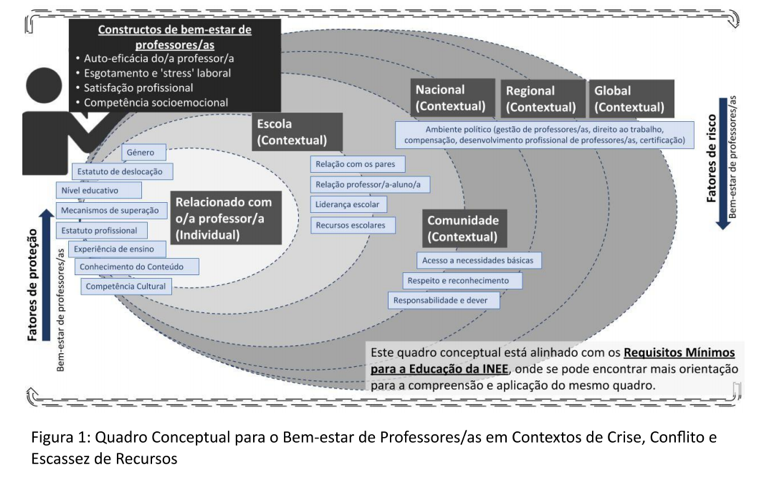Now available in 5 languages! Landscape Review on Teacher Well-being
We are thrilled to announce that the Landscape Review on Teacher Well-being in Low Resource, Crisis, and Conflict-affected Settings is now available in Arabic, English, French, Portuguese, and Spanish!
In crisis and conflict-affected settings, education can provide life-saving and sustaining support for children. Teachers play an essential role in supporting children’s wellbeing and ensuring that learning spaces are safe and protective, yet minimal attention is paid to teachers’ own wellbeing.
The Education Equity Research Initiative commissioned the Landscape Review to build a better understanding of teacher wellbeing in low resource, crisis, and conflict-affected contexts, and to chart a way forward for providing more comprehensive and sustained support to teachers in these settings.
The Landscape Review is organized into five sections: (1) introduction and background on the importance of teacher wellbeing; (2) methodology; (3) presentation of a Conceptual Framework for teacher wellbeing; (4) review of the existing research and evidence base on teacher wellbeing; and (5) presentation of a Key Actions Matrix with programmatic and policy guidance for supporting teacher wellbeing, aligned to the INEE Minimum Standards.
Of particular importance is the Conceptual Framework, which outlines individual and contextual factors that influence teacher wellbeing across various socio-ecological levels, and is meant to serve as a practical tool for global education stakeholders.

Policymakers, practitioners, advocates, researchers, and teachers themselves are encouraged to use both the Conceptual Framework and the Key Actions Matrix to inform their work. The resources can be used to guide policy conversations, identify intervention points for programming, and advocate for a variety of teacher management policies that promote teachers’ rights to work, certification, and compensation.
The Landscape Review and Conceptual Framework will also underpin the upcoming work of the INEE Teacher Wellbeing Reference Group, including the creation of an open-source Teacher Wellbeing Toolkit. Click to find out how you can contribute to this effort.
For more information on the Landscape Review, explore this recording and presentation (in English) from an August 2019 webinar by the authors.
We encourage you to download and share the Landscape Review widely!
---
Danielle Falk, Emily Varni, Julia Finder Johna, and Paul St. John Frisoli authored the Teacher Well-being Landscape Review.
Emily Varni ([email protected]) is an Education in Emergencies Specialist at Save the Children U.S. She has a background in teacher professional development and social-emotional learning in humanitarian and development contexts. In her current role at Save the Children, she supports education in emergencies and humanitarian response programming in Latin America & the Caribbean, East and Southern Africa, and the Middle East and Eastern Europe.
Danielle Falk ([email protected]) is a Doctoral Student at Teachers College, Columbia University. Her research focuses on the lived experiences of refugee and national teachers working amidst protracted conflict and forced displacement as well as the policy environment influencing their work. Prior to starting her doctorate, Danielle was the Lead Trainer and Capacity Building Manager for Teachers for Teachers in Kakuma refugee camp, Kenya.
Julia Finder Johna ([email protected]) is an Education in Emergencies Advisor in the Department of Education and Children Protection at Save the Children US. She has years of experience working in the education in emergencies sector and specializes in integrating mental health and psychosocial support interventions into education programming. Julia is co-chair of INEE’s PSS-SEL Collaborative, and co-chair of Save the Children’s MHPSS Technical Working Group.
Paul St. John Frisoli, Ed.D. ([email protected]) is a Senior Programme Specialist at the LEGO Foundation. He has a background in education in emergencies programming and evidence generation related to teacher professional development, play-based social-emotional learning and psychosocial support, teacher wellbeing, and curriculum development. In his current role at the LEGO Foundation, he supports programmes, evidence, and advocacy for play-based humanitarian initiatives throughout East Africa as well as supports holistic skills policy and advocacy.
Paul St. John Frisoli, Ed.D. ([email protected]) is a Senior Programme Specialist at the LEGO Foundation. He has a background in education in emergencies programming and evidence generation related to teacher professional development, play-based social-emotional learning and psychosocial support, teacher wellbeing, and curriculum development. In his current role at the LEGO Foundation, he supports programmes, evidence, and advocacy for play-based humanitarian initiatives throughout East Africa as well as supports holistic skills policy and advocacy.
The views expressed in this blog are the authors' own.



